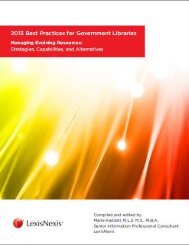2012 Best Practices for Government Libraries
2012 Best Practices for Government Libraries
2012 Best Practices for Government Libraries
You also want an ePaper? Increase the reach of your titles
YUMPU automatically turns print PDFs into web optimized ePapers that Google loves.
Communication<br />
216<br />
BEST PRACTICES <strong>2012</strong><br />
There is simply not enough time in the day or money in the travel fund to visit or<br />
call each person who has a question. If you consider the concept of business hours,<br />
there is even less time. Luckily, I am not limited to regular business hours and<br />
technology af<strong>for</strong>ds me the option to communicate with people when it is convenient<br />
<strong>for</strong> me and vice-versa.<br />
Email - It has become the center of the universe. It offers the customer the<br />
ability to lay out a problem and request a solution. It offers me the option to<br />
reply at a convenient time and have a written record of the request.<br />
Online meetings – Telecommuting is gaining popularity and I can see why.<br />
Gas is too expensive. While a face-to-face meeting is always nice, a lot of<br />
business can be taken care of on the phone and via online meetings. Tools<br />
like Webex allow us to share our computer screens and easily walk someone<br />
through a task or show them how you would solve a research problem. It is<br />
almost as good as walking over to someone’s office, leaning over their<br />
shoulder and walking them through a process.<br />
Telephone – Yes, we still use it… a lot. This invention certainly has some<br />
staying power!<br />
Smartphones – You can do all of the above, and you can still go to your<br />
son’s soccer game! I have even been known to have brief project-related<br />
discussions via text or chat while in the grocery store. I am certainly not a<br />
natural multi-tasker, but how much easier can it get?<br />
Collaboration<br />
Document sharing – I work with several analysts/in<strong>for</strong>mation professionals<br />
who are experts in different areas. Online document sharing via services<br />
such as Google Docs or wikis via a service like PBworks allow me to<br />
collaborate with my colleagues on research methodology, edit each other’s<br />
reports, and share research <strong>for</strong> a combined project. I think of these services<br />
as my virtual conference table with all the work laid out and ready to be<br />
reviewed, pieced together, or discussed.<br />
I also use document sharing services to post reports that are too large to<br />
email or that need to be marked up by the customer and returned. It helps<br />
to keep track of changes and versions. It also saves on printing and binding<br />
final reports.<br />
Professional community – Having a group of reliable professionals on whom<br />
you can rely is imperative. This could be your colleagues or an outside<br />
organization. The point is that we have somewhere to turn when we need<br />
assistance. I belong to an organization called the Association of<br />
Independent In<strong>for</strong>mation Professionals. This is a group of men and women<br />
who are experts in their fields and specialize in retrieving and organizing<br />
in<strong>for</strong>mation. I find them indispensable. The group has a listserv to which I<br />
have never submitted a question without receiving several on-point<br />
responses within a few hours. I will be the first to admit I do not know all



